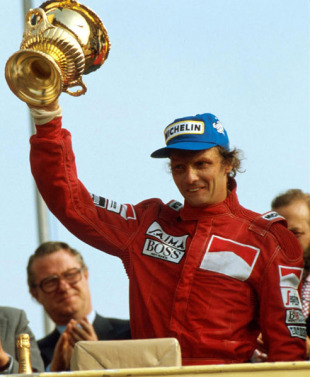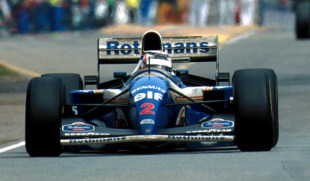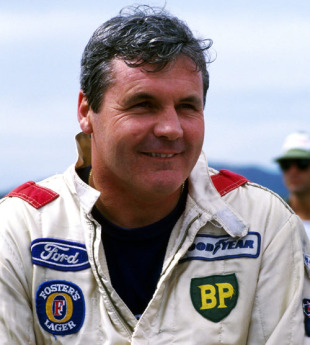- F1's best and worst comebacks
Will Schumacher be F1's next comeback kid?
Alan Henry December 17, 2009
- Drivers:
- Bernie Ecclestone
- |
- Damon Hill
- |
- Alan Jones
- |
- Niki Lauda
- |
- Nigel Mansell
- |
- Ayrton Senna
- |
- Sir Frank Williams
- |
- Ricardo Zunino
Veteran F1 reporter Alan Henry looks back at some of the successful and not so successful comebacks to F1 in light of Michael Schumacher's seemingly imminent return to the sport.
F1 returns are always risky. Niki Lauda's was possibly the most celebrated of all. Midway through the first practice session for the 1979 Canadian Grand Prix he steered his Brabham into the pit lane and told team boss Bernie Ecclestone that he was 'sick and tired' of driving in circles and wanted to retire. Ecclestone was a man who believed in acting decisively: "If you want to go, go now," he said understandingly.
Lauda went so promptly that he even left his helmet and overalls in the pits. The car - and the racing kit - was taken over by Argentine driver Ricardo Zunino, a very nice chap but not in the same class as Lauda. When some of Lauda's regular rivals came up behind Zunino later in the day, their first impression was that they couldn't believe how badly Lauda seemed to be driving.
For more than two years he never gave F1 a second glance, instead he worked to build up his airline business Lauda-Air. Then, out of the blue, at the end of 1981 he received an invitation from Ron Dennis to test one of the latest McLarens.
"So I said to Marlene [his then wife], 'right, how do you fancy going to London to do some shopping at Harrods?'" he told me in an interview for Motorsport magazine.
"She looked at me suspiciously and said 'OK.' So we fly to London and check in at the Capitol Hotel. I say 'OK, so here we are. You go shopping in Harrods and I've got some business to attend to.' She continued to look suspicious.

"I went straight up to Donington Park where McLaren were waiting with one of their cars. I drove quite a few laps and, although I wasn't what you'd call race fit, I knew that this was simply a matter of preparation. I knew I could do it.
"I went back to London and told Marlene where I had been and what I had been doing. 'You stupid b**t**d,' she called me. The next thing Frank Williams was on the phone: 'Hello Niki, how are you, enjoying yourself in England? How did your test go in the McLaren; why don't you come down to the factory for a talk?' I asked him how on earth he'd heard about it. He replied that it was his business to know everything."
In the event Lauda won his third race on his comeback for McLaren, and added a third world championship to his tally in 1984. His return was a huge success, well judged by both Lauda and Dennis. But, ultimately, Niki had the best car on the circuit, certainly in 1984 and 1985.
The same couldn't be said a decade later for Nigel Mansell. 'Our Nige,' the great British hero, had stormed to a meteoric world championship success in 1992, but then fell out with Frank Williams and decided to switch to the IndyCar series for 1993. He duly won the American championship at his first attempt.

In 1994 he was parachuted back into Williams as a sometime team-mate for Damon Hill after Ayrton Senna was killed in that year's San Marino Grand Prix. He did well, winning the Australian race at Adelaide and, buoyed by this success, signed a deal to drive for McLaren in 1995.
Just as Lauda had timed his arrival at McLaren to perfection, Mansell's switch during the first year of the team's engine supply contract with Mercedes did not prove a success. The chassis had a lurid handling imbalance and the engine displayed all the progressive response of a hand grenade. After taking part in only two races, team and driver went their separate ways. But it certainly was not Mansell's fault.
Alan Jones, who won the 1980 world championship for Williams, decided to make a return in 1983, just a year after retiring, in an effort to top-up his depleted finances. He briefly flirted with the Arrows team, and then committed himself to a full programme with the Haas Lola squad in 1985/86. But it turned out that the team was as cash-strapped as Jones and withdrew from the sport at the end of its second season.
So there have been wildly differing reasons to justify an F1 comeback. But if Schumacher decides to make a return, then it's simply because he misses the unique excitement which F1 can deliver. He reckons he is fit enough, motivated enough and sufficiently skilled to make it stick if he finally decides to come out of retirement.
Certainly, Schumacher is not doing it because he needs the cash.

